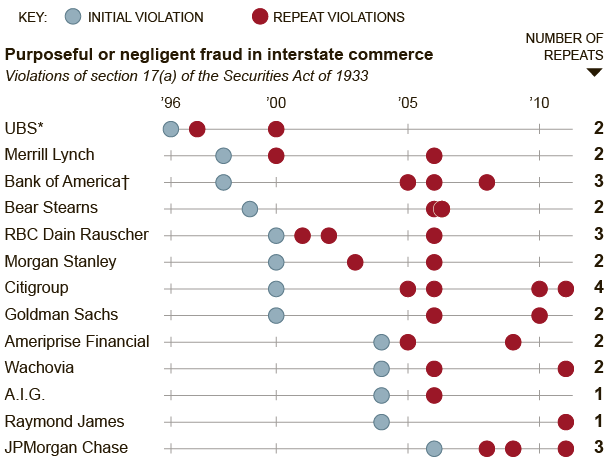
A graphic prepared by the New York Times demonstrating repeat violations among top financial firms that have signed anti-fraud agreements with the Securities and Exchange Commission.
Promises Made, and Remade, by Firms in S.E.C. Fraud Cases (New York Times):
When Citigroup agreed last month to pay $285 million to settle civil charges that it had defrauded customers during the housing bubble, the Securities and Exchange Commission wrested a typical pledge from the company: Citigroup would never violate one of the main antifraud provisions of the nation’s securities laws.
To an outsider, the vow may seem unusual. Citigroup, after all, was merely promising not to do something that the law already forbids. But that is the way the commission usually does business. It also was not the first time the firm was making that promise.
Citigroup’s main brokerage subsidiary, its predecessors or its parent company agreed not to violate the very same antifraud statute in July 2010. And in May 2006. Also as far as back as March 2005 and April 2000.
Citigroup has a lot of company in this regard on Wall Street. According to a New York Times analysis, nearly all of the biggest financial companies — Goldman Sachs, Morgan Stanley, JP Morgan Chase and Bank of America among them — have settled fraud cases by promising that they would never again violate an antifraud law, only to have the S.E.C. conclude they did it again a few years later.
A Times analysis of enforcement actions during the past 15 years found at least 51 cases in which the S.E.C. concluded that Wall Street firms had broken anti-fraud laws they had agreed never to breach. The 51 cases spanned 19 different firms.
…
Robert Khuzami, the S.E.C.’s enforcement director, said never-do-it again promises were a deterrent especially when there were repeated problems. In their private discussions, commissioners weigh a firm’s history with the S.E.C. before they settle on the amount of fines and penalties. “It’s a thumb on the scale,” Mr. Khuzami said. “No one here is disregarding the fact that there were prior violations or prior misconduct,” he said.
But prior violations are plentiful. For example, Bank of America’s securities unit has agreed four times since 2005 not to violate a major antifraud statute, and another four times not to violate a separate law. Merrill Lynch, which Bank of America acquired in 2008, has separately agreed not to violate the same two statutes seven times since 1999.
Of the 19 companies that the Times found by the S.E.C. to be repeat offenders over the last 15 years, 16 declined to comment. They read like a Wall Street who’s who: American International Group, Ameriprise, Bank of America, Bear Stearns, Columbia Management, Deutsche Asset Management, Credit Suisse, Goldman Sachs, JPMorgan Chase, Merrill Lynch, Morgan Stanley, Putnam Investments, Raymond James, RBC Dain Rauscher, UBS and Wells Fargo/Wachovia.